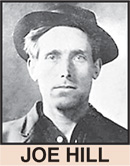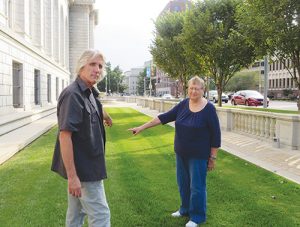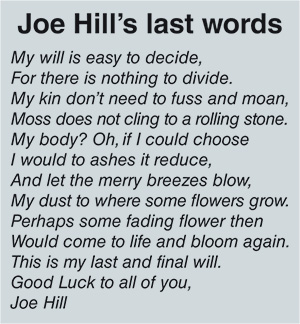St. Louis is unique as one of the few known places his ashes rest
By ED FINKELSTEIN
Publisher
 “Don’t mourn, organize”
“Don’t mourn, organize”
Did you know that St. Louis is one of the few known resting places for the ashes of famous Labor martyr Joe Hill, Labor organizer extraordinaire, who, as he was about to be put to death in 1915 in Utah on a phony charge, said, “Don’t waste time mourning, organize.”
In his will, has asked that his ashes be sent to every state in the nation (except Utah) to be, as he requested, “… let the merry breezes blow my dust to where some flowers grow.”

His Missouri ashes were spread on the 14th Street west side of the Main Public Library in downtown St. Louis, said Shannon Duffy, business representative, St. Louis United Media Guild (CWA Local 36047), who found an unpublished memoir of a member of the St. Louis ‘Wobblies,’ (the nickname of the Industrial Workers of the World – IWW – for which Joe was an ardent organizer) in the Mercantile Library on the UMSL campus.
“We are unique in that we’re one of the few cities that actually knows where Joe’s ashes were spread,” Duffy told the Labor Tribune. Noted the memoir: “In St. Louis, we held a short memorial service at one of the meeting rooms of the Public Library. After the meeting I scattered the ashes on one of the flower beds on the Fourteenth Street Side.”
A JOE HILL GARDEN?
To commemorate this unique piece of Labor history in one of America’s strongest union communities, Bread & Roses is proposing a garden be created on that spot at the library.
“I’m hoping the Library Board will recognize the significance of this and agree to join with us in creating a memorial garden,” said Duffy, president, St. Louis Bread & Roses.
“Given today’s growing belief in — and public support for — unions, it’s important that we commemorate one of Labor’s greatest organizers,” Duffy said. “He understood how to build a movement, and I firmly believe that’s what got him killed. He was so successful in organizing working people, his pro-union lyrics about rising up against the bosses just took off and that’s what probably triggered the strong desire on part of the ‘bosses’ to stop him.
“He was a true Labor troubadour who wrote pro union songs and those songs became wildly popular across America. Today, they are still sung everywhere union folks gather.”
ABOUT JOE
Joe Hill, also called Joe Hillstrom, original name Joel Emmanuel Hägglund, was born October 7, 1879 Sweden. He came to America in 1902.
He drifted around the country, from job to job, and in 1910 joined the San Pedro (California) IWW local, soon becoming its secretary. The following year his first and most famous folksong, “The Preacher and the Slave,” appeared in the IWW’s Little Red Song Book. It is sung to the melody of “In the Sweet Bye and Bye:”
You will eat, bye and bye
In that glorious land above the sky;
Work and pray, live on hay,
You’ll get pie in the sky when you die.
Most of his songs dealt with migratory workers, immigrant sweatshop workers, and railway employees and all were tinged with humor and a true Labor spirit.
FALSELY CHARGED
In January 1914, while staying with friends in Salt Lake City, Hill was arrested and charged with the murder of a grocer and his son who had been killed during a robbery. The trial that followed was very confusing.
 The prosecution’s case was based on circumstantial evidence and depended almost entirely on the fact that Hill had gone to a doctor to be treated for a gunshot wound several hours after the murders had occurred. Hill claimed that he had received the wound in a quarrel over a woman, whom he refused to identify in the interest of protecting her honor.
The prosecution’s case was based on circumstantial evidence and depended almost entirely on the fact that Hill had gone to a doctor to be treated for a gunshot wound several hours after the murders had occurred. Hill claimed that he had received the wound in a quarrel over a woman, whom he refused to identify in the interest of protecting her honor.
Despite numerous legal appeals made on Hill’s behalf, mass demonstrations, appeals from leaders around the world and even President Woodrow Wilson that he had been convicted because of his radicalism, Hill was executed by a firing squad.
His body was taken to Chicago and cremated. The ashes were put in little packets, and one of which was sent to the secretary of each of the Wobbly locals across America, Duffy noted.
His execution ultimately made him a martyr and a folk hero in the American Labor Movement.
(Information from Shannon Duffy research, Wikipedia and the AFL-CIO.)


